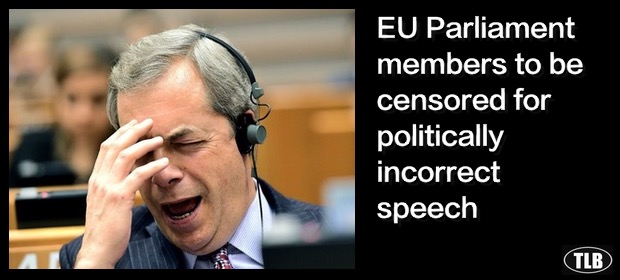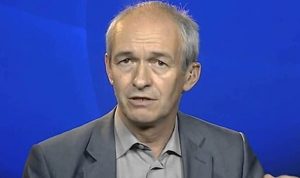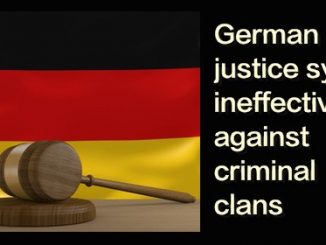
European Parliament Votes to Censor Politically Incorrect Speech
MICHAEL TENNANT
Worried by the rise of nationalist parties that threaten the very existence of the European Union (EU), the European Parliament (EP) has quietly amended its internal rules to enable the silencing of “racist” speech within its hallowed halls.
The rule change, which passed in December, allows the president of the EP to “interrupt the live broadcasting of” a parliamentary debate “in the case of defamatory, racist or xenophobic language or behavior by a member.” Furthermore, it gives the president the power to “delete” said incident “from the audiovisual record of the proceedings,” consigning it to the memory hole unless a journalist happens to be present to report on it. Offenders may be fined up to $9,500.
Conveniently, the rule doesn’t define what constitutes “defamatory, racist or xenophobic language or behavior,” leaving it to the president’s discretion, although the EP Bureau, which consists of the president and 14 vice presidents, must review the decision within four weeks.
“This undermines the reliability of the Parliament’s archives at a moment where the suspicion of ‘fake news’ and manipulation threatens the credibility of the media and the politicians,” Tom Weingaertner, president of the Brussels-based International Press Association (IPA), told the Associated Press.
Weingaertner said the IPA was never consulted on the rule, which came to light only when the Spanish newspaper La Vanguardia reported on it.
The AP gives some hints into what kinds of language and behavior might be censored under the new rule. Noting that the EP “is often the stage for political and sometimes nationalist theater,” the AP writes, “Beyond routine shouting matches, members occasionally wear T-shirts splashed with slogans or unfurl banners. Flags adorn some lawmakers’ desks.”
As if putting the flag of the country one represents on one’s desk weren’t scurrilous enough, the AP says that “in recent years, lawmakers have gone too far.”
 “There have been a growing number of cases of politicians saying things that are beyond the pale of normal parliamentary discussion and debate,” British EP member Richard Corbett (pictured), a socialist who shepherded the rule change through parliament, told the AP. “What if this became not isolated incidents, but specific, where people could say: ‘Hey, this is a fantastic platform. It’s broad, it’s live-streamed. It can be recorded and repeated. Let’s use it for something more vociferous, more spectacular.’”
“There have been a growing number of cases of politicians saying things that are beyond the pale of normal parliamentary discussion and debate,” British EP member Richard Corbett (pictured), a socialist who shepherded the rule change through parliament, told the AP. “What if this became not isolated incidents, but specific, where people could say: ‘Hey, this is a fantastic platform. It’s broad, it’s live-streamed. It can be recorded and repeated. Let’s use it for something more vociferous, more spectacular.’”
Of course, if a member of the EP made a speech denying the Holocaust or stumping for the reintroduction of chattel slavery, there would be no need for the president to cut him off. His foolish words would be sufficient to brand him an outcast, and the public response to his remarks would be deafening.
No, what the EP really wants to silence is dissenting political speech, especially if it might lead to the EU’s dissolution. Reports the AP:
After Britain’s decision to leave the European Union, the rising popularity of anti-immigrant candidates like Geert Wilders in the Netherlands or far-right Marine Le Pen in France is worrying Europe’s political mainstream. Le Pen, who is running for the French presidency this spring, has promised to follow Britain’s lead.
At the European Parliament, where elections are due in 2019, many say the need for action against hate speech, and strong sanctions for offenders, is long overdue.
Parliamentarians who hold dissenting views, such as Gerolf Annemans of Belgium’s Flemish independence party Vlaams Belang, know exactly where this is headed. During debate in December, Annemans said the rule “can be abused by those who have hysterical reactions to things that they qualify as racist, xenophobic, when people are just expressing politically incorrect views.”
 Annemans’ warning is eminently reasonable. Prominent Europeans have been tried and convicted of “hate speech” for expressing opinions on Islam or immigrants that do not comport with those of the powers that be. Wilders, for instance, was recently found “guilty of inciting discrimination” for telling supporters he would “arrange” to have fewer Moroccan immigrants in the country. France prosecuted journalist Eric Zemmour (pictured) and actress Brigitte Bardot for making remarks critical of Islam. It’s not much of a stretch to think that the EP would gladly stifle similar opinions during its proceedings.
Annemans’ warning is eminently reasonable. Prominent Europeans have been tried and convicted of “hate speech” for expressing opinions on Islam or immigrants that do not comport with those of the powers that be. Wilders, for instance, was recently found “guilty of inciting discrimination” for telling supporters he would “arrange” to have fewer Moroccan immigrants in the country. France prosecuted journalist Eric Zemmour (pictured) and actress Brigitte Bardot for making remarks critical of Islam. It’s not much of a stretch to think that the EP would gladly stifle similar opinions during its proceedings.
The AP describes the EP’s current system for cutting off politically incorrect debate and notes that a time-delayed broadcast is also a possibility. But with the multiplicity of languages spoken in the EP and the varying opinions on what constitutes hate speech, “misunderstandings and even abuses could crop up,” observes the news service.
This sort of thing has even supporters of the rule a bit concerned. Helmut Scholz of Germany’s left-wing Die Linke party told the AP that EP members, being popularly elected, must be permitted to express their opinions on Europe in parliament, saying, “You can’t limit or deny this right.” He also warned that allowing debate to be cut off and remarks to be deleted from the record could lead to fake news based on selective extracts of debates. He said he still thinks there needs to be some way “to stop distribution of” genuinely evil ideas, although the AP admits that such things as “Nazi rallying cries and racist obscenities are relatively rare.”
Parliaments are supposed to be forums for open debate. The pro-EU forces at the EP, however, are apparently afraid of public discussion of certain topics, preferring instead to muzzle those with alternative viewpoints. But if the EU and its member states’ open-borders policies are so obviously superior to the alternatives, what do the European elites have to fear?
************
ER recommends other articles by The New American
featured photo of Nigel Farage provided by Emmanuel Dunand/AFP/Getty Images




